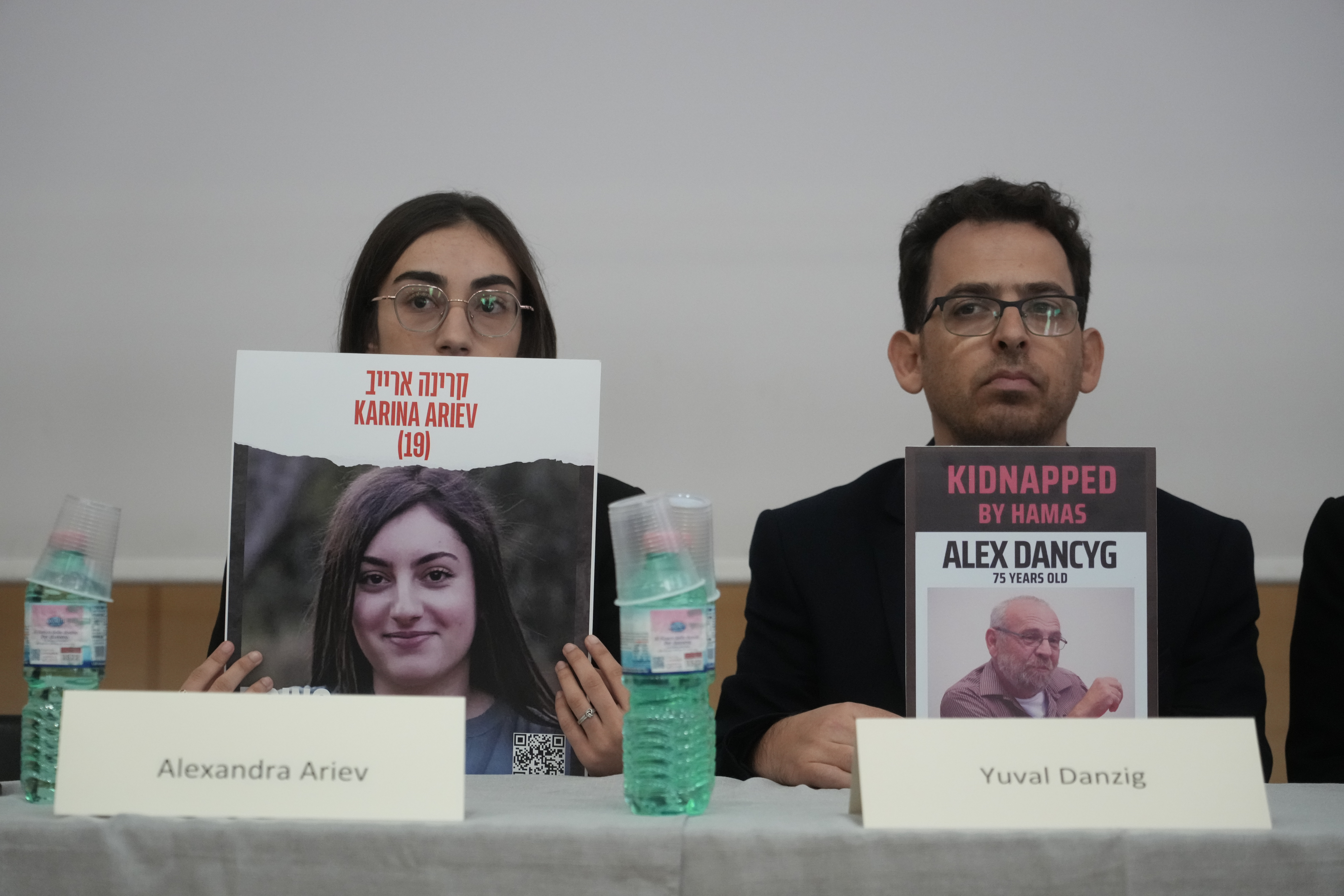Pope meets relatives of Israeli hostages and Palestinians in Gaza and sets off firestorm over words
Did he say "genocide" or not?


VATICAN CITY — Pope Francis met separately Wednesday with relatives of Israeli hostages in Gaza and Palestinians living through the war and set off a firestorm by using words that Vatican diplomats usually avoid: “terrorism” and, according to the Palestinians, “genocide.”
Francis spoke about the suffering of both Israelis and Palestinians after his meetings, which were arranged before the Israeli-Hamas hostage deal and a temporary halt in fighting was announced. Francis didn’t refer to the deal, which marked the biggest diplomatic breakthrough since the war erupted following Hamas’ Oct. 7 attack on southern Israel.
Francis met at the Vatican with 12 relatives of some of the 240 hostages held by Hamas in Gaza for about 20 minutes. Separately, he met for about the same amount of time with 10 Palestinians whose relatives have been killed or otherwise affected by the war in Gaza, along with priests who minister there.
Francis spoke about the meetings at the end of his weekly general audience in St. Peter’s Square, where some people in the VIP seats wearing Palestinian scarves held up small posters showing bodies in a ditch and the word “Genocide” written underneath.
“Here we’ve gone beyond war. This isn’t war anymore, this is terrorism,” Francis told the crowd. “Please, let us go ahead with peace. Pray for peace, pray a lot for peace.”
He also asked for God to help both Israeli and Palestinian people “resolve problems and not go ahead with passions that are killing everyone in the end.”
Francis has spoken out repeatedly calling for an end to the war and has tried to maintain the Vatican’s typical diplomatic neutrality in conflicts. The Vatican is particularly concerned about the plight of Christians in Gaza.
The Hamas attack last month killed about 1,200 people in Israel. Israel’s retaliatory strikes on Gaza have killed more than 11,000 people, according to Palestinian health authorities.
Members of the Palestinian delegation said they were stunned by Francis’ deep knowledge of the toll the war has taken on the people of Gaza and said he used the term “genocide” to describe it during their private meeting.
No journalists were present during either meeting.
“He knew that Gaza has no water,” said Shireen Hilal, who lives in Bethlehem in the West Bank but was part of the delegation. “He knew that there was no electricity. He knew that there is no medicine.”
The Vatican spokesman, Matteo Bruni, said he didn’t believe that Francis used the term "genocide."
“He used the terms he used during the general audience and regardless represent the terrible situation that Gaza is living,” Bruni said.
But the Palestinians doubled down. “Ten people heard it,” said another member of the delegation, Suhair Anastas, who left Gaza in the last week with her daughter, among those allowed to leave because she also holds a Canadian passport.
Francis often causes diplomatic kerfuffles with his off-hand comments. He has used the term “genocide” before in reference to the Ottoman-era Turkish attacks on Armenians and, more casually, agreed when asked if the Catholic abuses against Indigenous peoples in Canada amounted to a genocide.
The Israeli relatives, for their part, thanked Francis for receiving them but some expressed dismay that he didn’t have more time to hear from all members of the delegation. They also questioned his use of the term “terrorism” without saying who had committed it. They expressed hope that he might be able to use his moral authority to help free all the hostages.
Evgeniia Kozlova, the Russian mother of 27-year-old Andrey Kozlov who was kidnapped by Hamas on Oct. 7 at the music festival in southern Israel, feared that the hostage-release deal would leave her son in Hamas’ hands for years.
“We know the terms of the exchange of 50 hostages. These are women and children,” she said. Recalling that it took Israel five years to free the detained Israeli soldier Gilad Shalit, “If each of the remaining hostages is released once every five years, then my son will return in 1,000 years,” she said.
Rachel Goldberg, whose son Hersh Goldberg-Polin was also kidnapped at the music festival, urged Francis and the rest of the world to work for all the hostages to be released.
“And in the meantime, we would like the International Red Cross or any other humanitarian aid organization on planet Earth to go and see every single hostage and let us know: Are they alive? Have they been treated? Are they getting the care that they need?” she said.












